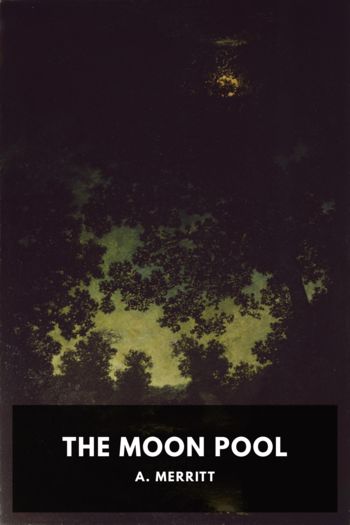Short Fiction - H. P. Lovecraft (i can read book club .TXT) 📗

- Author: H. P. Lovecraft
Book online «Short Fiction - H. P. Lovecraft (i can read book club .TXT) 📗». Author H. P. Lovecraft
As he spoke, I caught a glimpse of his face in the yellow beam from a solitary attic window. It was a noble, even a handsome, elderly countenance; and bore the marks of a lineage and refinement unusual for the age and place. Yet some quality about it disturbed me almost as much as its features pleased me—perhaps it was too white, or too expressionless, or too much out of keeping with the locality, to make me feel easy or comfortable. Nevertheless I followed him; for in those dreary days my quest for antique beauty and mystery was all that I had to keep my soul alive, and I reckoned it a rare favor of Fate to fall in with one whose kindred seekings seemed to have penetrated so much farther than mine.
Something in the night constrained the cloaked man to silence, and for a long hour he led me forward without needless words; making only the briefest of comments concerning ancient names and dates and changes, and directing my progress very largely by gestures as we squeezed through interstices, tiptoed through corridors, clambered over brick walls, and once crawled on hands and knees through a low, arched passage of stone whose immense length and tortuous twistings effaced at last every hint of geographical location I had managed to preserve. The things we saw were very old and marvelous, or at least they seemed so in the few straggling rays of light by which I viewed them, and I shall never forget the tottering Ionic columns and fluted pilasters and urn-headed iron fenceposts and flaring-linteled windows and decorative fanlights that appeared to grow quainter and stranger the deeper we advanced into this inexhaustible maze of unknown antiquity.
We met no person, and as time passed the lighted windows became fewer and fewer. The streetlights we first encountered had been of oil, and of the ancient lozenge pattern. Later I noticed some with candles; and at last, after traversing a horrible unlighted court where my guide had to lead with his gloved hand through total blackness to a narrow wooden gate in a high wall, we came upon a fragment of alley lit only by lanterns in front of every seventh house—unbelievably Colonial tin lanterns with conical tops and holes punched in the sides. This alley led steeply uphill—more steeply than I thought possible in this part of New York—and the upper end was blocked squarely by the ivy-clad wall of a private estate, beyond which I could see a pale cupola, and the tops of trees waving against a vague lightness in the sky. In this wall was a small, low-arched gate of nail-studded black oak, which the man proceeded to unlock with a ponderous key. Leading me within, he steered a course in utter blackness over what seemed to be a gravel path, and finally up a flight of stone steps to the door of the house, which he unlocked and opened for me.
We entered, and as we did so I grew faint from a reek of infinite mustiness which welled out to meet us, and which must have been the fruit of unwholesome centuries of decay. My host appeared not to notice this, and in courtesy I kept silent as he piloted me up a curving stairway, across a hall, and into a room whose door I heard him lock behind us. Then I saw him pull the curtains of the three small-paned windows that barely showed themselves against the lightening sky; after which he crossed to the mantel, struck flint and steel, lighted two candles of a candelabrum of twelve sconces, and made a gesture enjoining soft-toned speech.
In this feeble radiance I saw that we were in a spacious, well-furnished and paneled library dating from the first quarter of the Eighteenth Century, with splendid doorway pediments, a delightful Doric cornice, and a magnificently carved overmantel with scroll-and-urn top. Above the crowded bookshelves at intervals along the walls were well-wrought family portraits; all tarnished to an enigmatical dimness, and bearing an unmistakable likeness to the man who now motioned me to a chair beside the graceful Chippendale table. Before seating himself across the table from me, my host paused for a moment as if in embarrassment; then, tardily removing his gloves, wide-brimmed hat, and cloak, stood theatrically revealed in full mid-Georgian costume from queued hair and neck ruffles to knee-breeches, silk hose, and the buckled shoes I had not previously noticed. Now slowly sinking into a lyre-back chair, he commenced to eye me intently.
Without his hat he took on an aspect of extreme age which was scarcely visible before, and I wondered if this unperceived mark of singular longevity were not one of the sources of my original disquiet. When he spoke at length, his soft, hollow, and carefully muffled voice not infrequently quavered; and now and then I had great difficulty in following him as I listened with a thrill of amazement and half-disavowed alarm which grew each instant.
“You behold, Sir,” my host began, “a man of very eccentrical habits, for whose costume no apology need be offered to one with your wit and inclinations. Reflecting upon better times, I have not scrupled to ascertain their ways and adopt their dress and manners; an indulgence which offends none if practised without ostentation. It hath been my good fortune to retain the rural seat of my ancestors, swallowed though it was by two towns, first Greenwich, which built up hither





Comments (0)